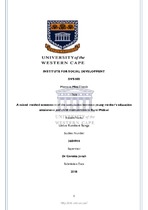A mixed method assessment of the association between young mother’s education attainment and child malnutrition in rural Malawi
Abstract
Malnutrition is a big public health concern in Malawi. Almost 40% of under-five children in Malawi suffer from malnutrition. Children born to poor mothers with low education levels have higher chances of being malnourished. Great disparities are also seen between children born in rural areas and those born in cities and towns. This research examines the linkages between mothers’ education attainment and child malnutrition. The Capability Approach and the UNICEF Conceptual Framework on child malnutrition was used in ascertaining how education affects mother’s choices and practices on child’s health and nutrition. The Explanatory Sequential Mixed Method Design was used. Combining elements of Qualitative and Quantitative research methods to provide depth and breadth of how mother’s education affects child’s health and nutrition. Findings from the Quantitative analysis of the 2015-2016 Malawi Demographic and Health Surveys data on child malnutrition and women’s education, informed the qualitative approach. The results guided in purposively sampling participants for the Qualitative research. Stata 14 was used to analyse quantitative data. Themes were drawn from the qualitative data and an analysis of the recurring themes was done using Atlas.ti 8. The study found that there is an association between mother’s education and child health. Children born to mothers with secondary and higher education qualification have lower odds of malnutrition and poor health. Inadequate knowledge on nutrition, food and nutrition insecurity, poverty and low welfare status of mothers with low education levels are contributing factors to high incidences of malnutrition among their children. Malawi needs to invest in girl’s education; particularly in rural areas where many girls do not transition to secondary school.

